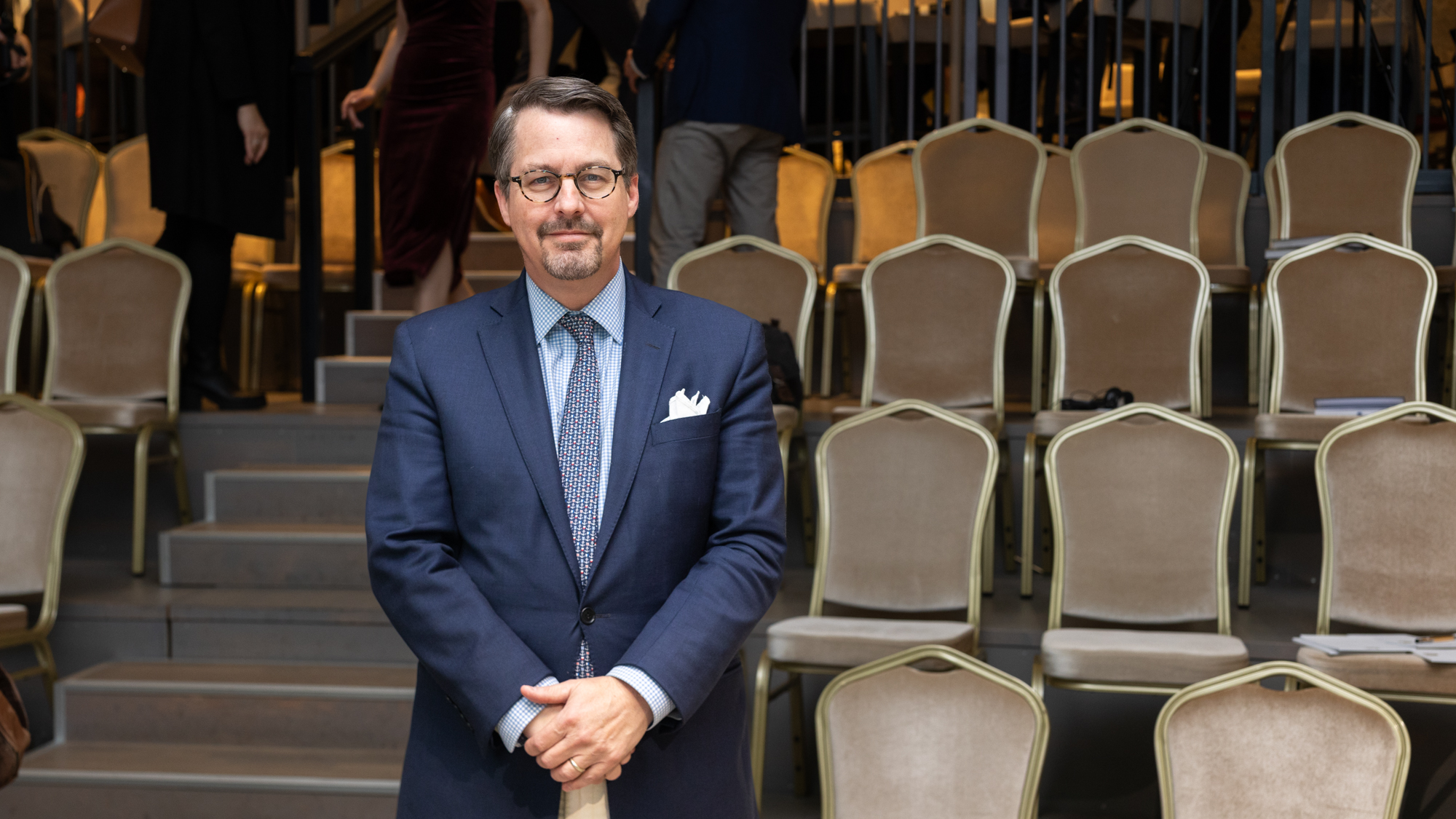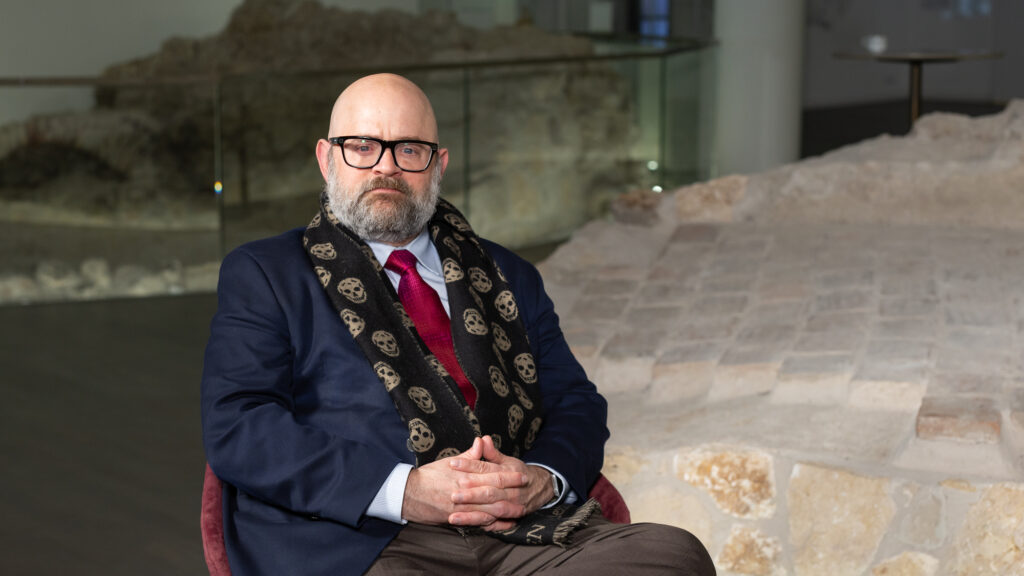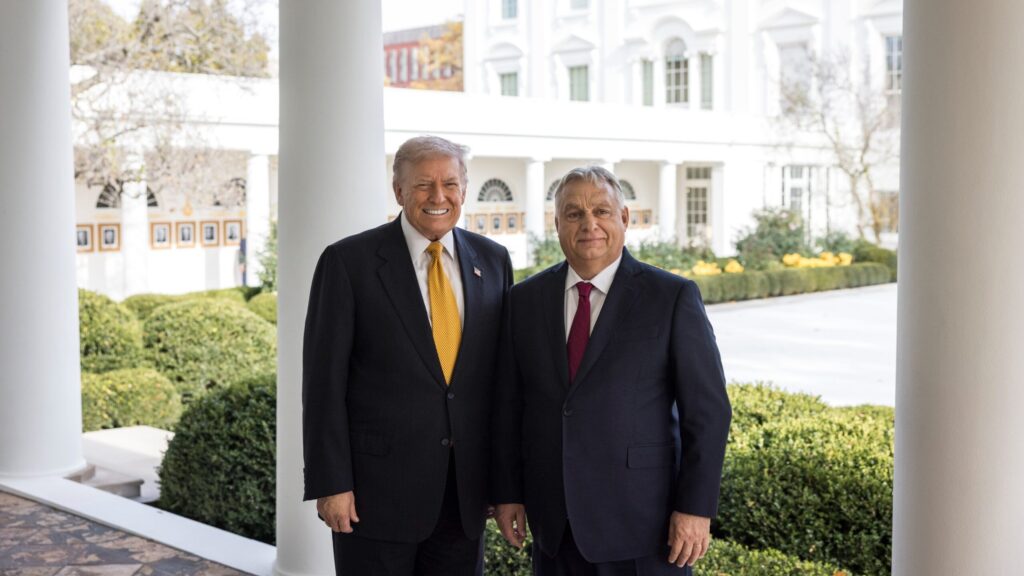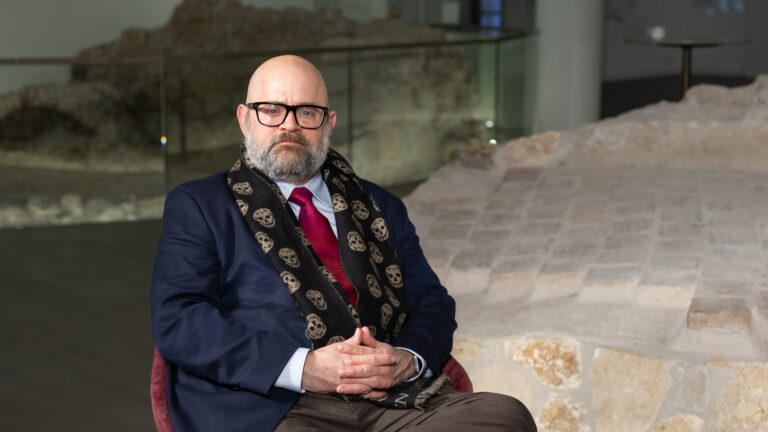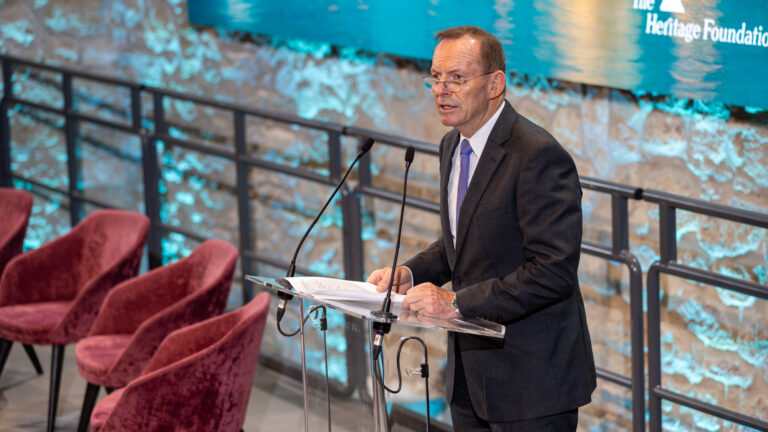Dr Chad Pecknold is an Associate Professor of Systematic Theology at The Catholic University of America in Washington, DC and the Board Director for the pro-life advocacy group Americans United for Life. He travelled to Budapest, Hungary to speak at Axioma Center’s conference on the Christian view on anthropology and humanity’s self-image. There, he was also kind enough to give another exclusive interview to our website.
***
President Trump and Prime Minister Orbán met two weeks ago.
On 7 November.
Yeah, exactly two weeks ago [at the time of recording the interview]. But even going back to the 2024 presidential campaign, President Trump talked a lot about Prime Minister Orbán. As an American voter, was that something you noticed? He kept bringing up that ‘I am friends with Prime Minister Orbán and he said that the only way we could stop the Russo–Ukrainian war is if I get back in office.’ That was quite unusual for a presidential candidate to talk that much about a foreign leader.
Well, I think it’s very clear that the President sees in the Prime Minister his counterpart in Europe. He sees in Prime Minister Orbán someone who also wants to ‘Make Europe Great Again’. Make Hungary Great Again has been his 15-year mission, but now, having, in a sense, succeeded, he’s able to stand up for national sovereignty throughout Europe against Brussels—not against the EU per se, but against a sort of global liberal mindset that actually destroys nations. So I think Orbán is really his only counterpart in Europe, if you think about America as having a stake in Europe, as having a stake in NATO.
When Vice President JD Vance gave his ‘tear down this firewall’ speech at the Munich Security Conference, I think the gasps in the room were about this kind of humiliating realization that Europe actually is, on some level, dependent on the United States, and it shouldn’t be. It shouldn’t be dependent on the United States, but Brussels’ globalist mindset has weakened the nation so thoroughly that it’s time for Europe to take back its countries. And Orbán is the first one to do it.
Orbán has taken Hungary back, and young people in Hungary need to understand that. Many young people that I talk to on the streets in Budapest have no living memory of what things were like before Orbán. But Trump knows. Trump knows what Orbán achieved and how important what he’s achieved is for saving Europe.
A couple of months ago, we had a conference here about Margaret Thatcher, who had a famous friendship with President Ronald Reagan, a very close relationship between the US president and a foreign leader. Are there any similarities between that and the one between President Trump and PM Orbán?
I think it’s a nice analogy. I think there was a deep, warm, personal friendship, but also a kind of political similarity between Reagan and Thatcher. And you can see that warm friendship between Orbán and Trump, and also the political similarity.
They both see things in a similar way—that liberalism has been destructive. It’s been destructive of the human person. It’s made people go crazy over the family, over the border, and over what actually binds us together as a people: our culture, our history. ‘Make America Great Again’ was President Trump’s campaign slogan. But beneath that slogan is this idea that you can change it; it doesn’t have to be this way. We don’t actually have to, you know, have 72 genders. We don’t actually have to destroy the family. We don’t have to have alternative forms of family. These things are really bedrocks for society, and the way in which liberalism has eroded those bedrocks has to be rejected. Both Orbán and Trump have been rejecting those and providing nations with access to their histories, access to Christian history. The most important thing, to my mind, was the reclamation of the importance of King St Stephen for the sovereignty of Hungary.
I think you’re seeing a very similar conversation in America, where public neutrality over religion was completely shattered by wokeism. The sort of wokeification of America—with Black Lives Matter and the LGBTQ++ movement—was so powerfully religious, kind of a fake Ersatz religion, that all of a sudden people realized: ‘Well, if we are not allowed to be publicly Christian in our society, we’re going to get some bad religion in its place.’
Thus, you have seen in America all the most important statesmen, for example at the Charlie Kirk Memorial, standing up and giving beautiful orations on Christian nations, the importance of being Christian, and the importance of Christian statesmanship. I believe that is another kind of analogy—that maybe it’s actually only by recovering the Christian roots of Western civilization that we can really ground our sovereignty. We can’t just insist on being the nations that we are. That’s not sufficient to be a strong nation. You have to have this greater sense of being connected together by God, and the desire for an unashamed place for Christianity in public life.
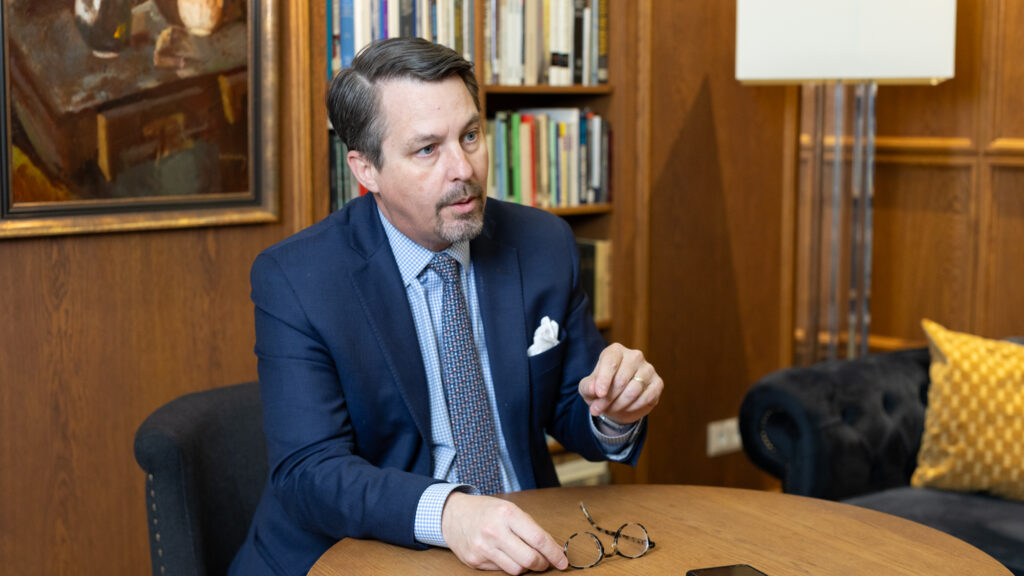
Going back to the recent meeting between Prime Minister Orbán and President Trump, what was the American reaction to it? Because from what I saw, it was more subdued than it had been when they met during his first term. This sort of ‘authoritarian’ rhetoric directed towards Prime Minister Orbán was not as prominent after this meeting, do you agree?
In the first Trump White House, the goal every single day for the media—the fake news media—was to show that Trump was a tyrant, that Trump was a totalitarian, that Trump was an authoritarian despot. Every day of the first Trump White House, that is what the administration had to deal with, and he was ineffective as a result because he had to be constantly on the defensive against these charges.
When Orbán came over the first time, that just fit the narrative, right? Another strong leader who actually doesn’t believe that liberalism is going to be good for the country is standing up. And so Orbán just sort of walked into the daily narrative. He was hit with that as part of the narrative of, as we say, the 45th administration.
This 47th administration is much, much more effective. Trump is winning every single day. He has been making deals. And the opposition is demoralized. They no longer can say ‘Nazi’ every day, they no longer can say ‘authoritarian’ every day. They’ve exhausted that criticism.
By the way, everybody on the right told them that if you just keep using these terms, they are going to lose their meaning, and it eventually happened.
Yeah, they don’t have any meaning anymore, and they know that. This is why they’ve actually shifted to racism and antisemitism. They’re shifting to other historical kinds of problems because the authoritarian, Nietzsche’s Übermensch kind of totalitarian tyrant is not working. So they’ve shifted to other ad hominems. But that’s all it is, ad hominems, because they don’t want to face the facts that you have a White House that is actually making deals which are good for other countries.
I was part of discussions with Ambassador Takács since 2020, when Biden basically engaged in a punitive relationship with Hungary for his whole term. He was vindictive, he misused his power to hurt Hungary. And there was really nothing we could do about it, except for bringing the interests of Hungary into the American conservative movement. I think we actually changed the nature of American discourse about Hungary. Hungarian policies, especially Hungarian family policy, totally reshaped how conservatives began thinking about how we would win power back. So Hungary, if you think about it, actually helped us win power back so that we could have a White House that was friendly to Hungary again. It is a really beautiful symbiosis. When you had that meeting on 7 November between Trump and Orbán, you actually were seeing the culmination of a long fight for our freedom.
We are here at a Christian conference hosted by the Axioma Center. So, let me ask you about that too: are you enjoying it? Do you think it’s important to hold Christian conferences, theological conferences like this, which are pretty rare, I believe?
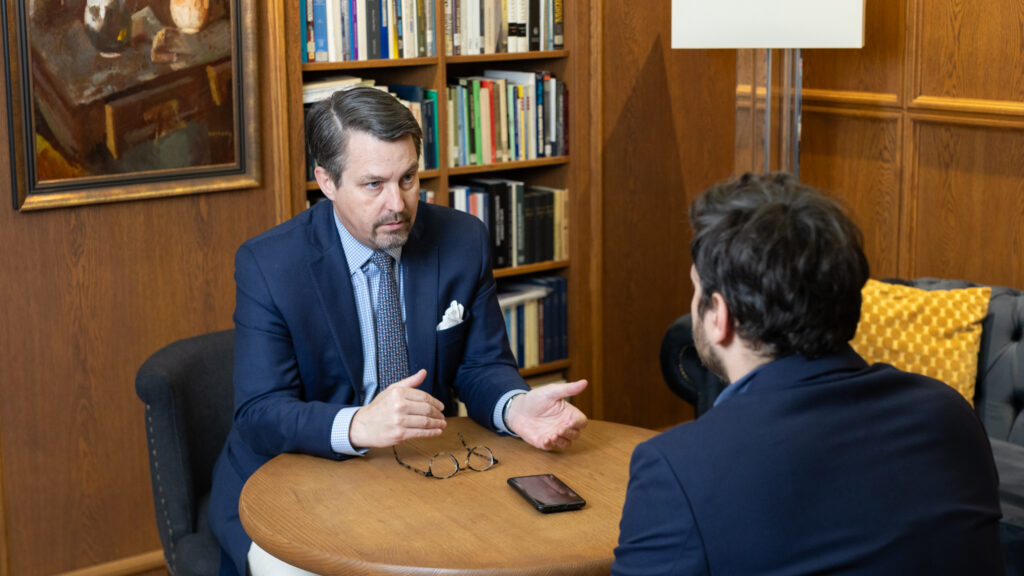
I would say it’s more than just important; it’s essential because now we’re in the position to recognize publicly what our nations are. I can stand up and say that liberalism is bad for nations, and I can say that Christianity is generally, on average, good for nations over history. I can stand up and say that as a thinker. It’s a whole other thing when nations themselves stand up and say that, when statesmen stand up and say that, when Prime Minister Orbán says that, or when Trump says that, or when JD Vance says that. It means that Christianity is important again for public life. It means Christianity is important as a kind of fundament for the state. You need Christianity to be praised rather than persecuted. And Hungary understands that, and I think America is recovering. Making America Great Again is, in part, actually remembering our Christian past, both Catholic and Protestant. I think not to have think tanks that are thinking in Christian terms about all the things that matter for life is unacceptable. We need them. You’ve got one important think tank, Axioma, which does this. We actually don’t have this in the United States.
‘Christianity is important again for public life’
We need a think tank in Washington, DC that tackles policy questions seriously—not from a liberal perspective, but from a Christian one—and isn’t afraid to say that Christianity offers profound wisdom on nearly every social and political issue. Does that mean we’d be stuck in the past? Not at all; in fact, it’s precisely what drives societies forward.
Wasn’t Charlie Kirk’s main thesis about returning to Christianity? So maybe Turning Point USA, his organization, could take on that role?
It was his intent. He was most eloquent on this, on how all of the 13 original colonies that became states all had Christian confessions. They were Christian states who came together in a United States. And the First Amendment protecting the freedom of worship was really just respecting that each of the states was Christian. One was Catholic, one was Baptist, and one was Anglican—so each of the states had different kinds of Christian confessions, but they were all Christian confessions.
So Charlie Kirk was absolutely insistent that we recover that narrative, that the United States is actually a collection of Christian states which formed one federal government, and that’s a fact. Charlie Kirk was extremely good at just reminding liberals that this is a fact, and it’s liberals in America who have tried to destroy all those facts. They tried to destroy Christopher Columbus and his faith. They tried to destroy any semblance of a Christian past as having any goodness in it. Christianity is generally viewed by them the way Nietzsche views it. And that’s been so destructive. It’s been so destructive for America, and we finally said we’re not gonna live that way anymore. We don’t have to live that way anymore. We can actually say Christianity is good and not be ashamed of that.
Related articles:

